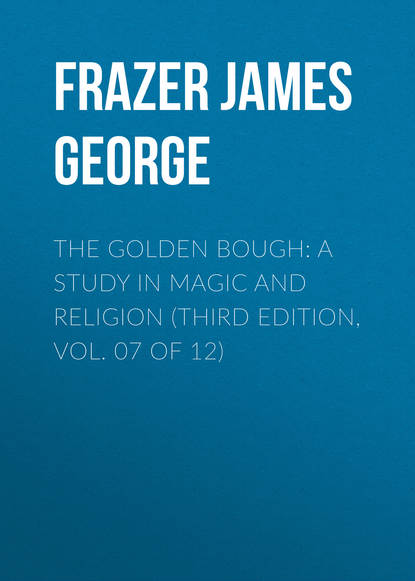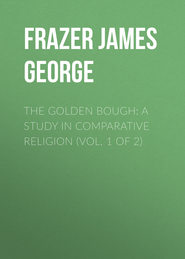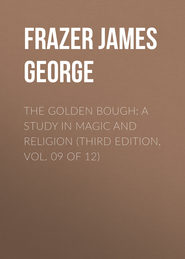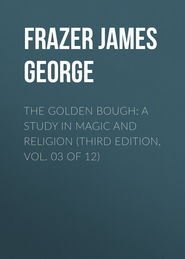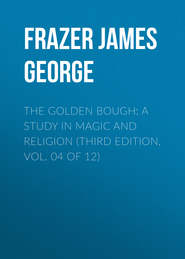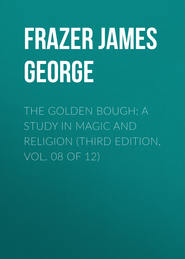По всем вопросам обращайтесь на: info@litportal.ru
(©) 2003-2024.
✖
The Golden Bough: A Study in Magic and Religion (Third Edition, Vol. 07 of 12)
Настройки чтения
Размер шрифта
Высота строк
Поля
203
Scholia in Lucianum, ed. H. Rabe (Leipsic, 1906), pp. 279 sq. (scholium on Dialog. Meretr. vii. 4).
204
Dittenberger, Sylloge Inscriptionum Graecarum,
Nos. 192, 246, 587, 640; Ἐφημερὶς Ἀρχαιολογική, 1884, coll. 135 sq. The passages of inscriptions and of ancient authors which refer to the festival are collected by Dr. L. R. Farnell, The Cults of the Greek States, iii. (Oxford, 1907) pp. 315 sq. For a discussion of the evidence see August Mommsen, Feste der Stadt Athen im Altertum (Leipsic, 1898), pp. 359 sqq.; Miss J. E. Harrison, Prolegomena to the Study of Greek Religion, Second Edition (Cambridge, 1908), pp. 145 sqq.
205
The threshing-floor of Triptolemus at Eleusis (Pausanias, i. 38. 6) is no doubt identical with the Sacred Threshing-floor mentioned in the great Eleusinian inscription of 329 b. c. (Dittenberger, Sylloge Inscriptionum Graecarum,
No. 587, line 234). We read of a hierophant who, contrary to ancestral custom, sacrificed a victim on the hearth in the Hall at Eleusis during the Festival of the Threshing-floor, “it being unlawful to sacrifice victims on that day” (Demosthenes, Contra Neaeram, 116, pp. 1384 sq.), but from such an unlawful act no inference can be drawn as to the place where the festival was held. That the festival probably had special reference to the threshing-floor of Triptolemus has already been pointed out by O. Rubensohn (Die Mysterienheiligtümer in Eleusis und Samothrake, Berlin, 1892, p. 118).
206
See above, pp. 41 (#x_8_i11)sq., 43 (#x_8_i15). Maximus Tyrius observes (Dissertat. xxx. 5) that husbandmen were the first to celebrate sacred rites in honour of Demeter at the threshing-floor.
207
See above, p. , note 4.
208
Harpocration, s. v. Ἁλῶα (vol. i. p. 24, ed. G. Dindorf).
209
Dittenberger, Sylloge Inscriptionum Graecarum,
No. 587, lines 124, 144, with the editor's notes; August Mommsen, Feste der Stadt Athen im Altertum, p. 360.
210
So I am informed by my friend Professor J. L. Myres, who speaks from personal observation.
211
This is recognised by Professor M. P. Nilsson. See his Studia de Dionysiis Atticis (Lund, 1900), pp. 95 sqq., and his Griechische Feste, p. 329. To explain the lateness of the festival, Miss J. E. Harrison suggests that “the shift of date is due to Dionysos. The rival festivals of Dionysos were in mid-winter. He possessed himself of the festivals of Demeter, took over her threshing-floor and compelled the anomaly of a winter threshing festival” (Prolegomena to the Study of Greek Religion, Second Edition, p. 147).
212
Scholiast on Lucian, Dial. Meretr. vii. 4 (Scholia in Lucianum, ed. H. Rabe, Leipsic, 1906, pp. 279-281).
213
Clement of Alexandria, Protrept. ii. 15 and 20, pp. 13 and 17 ed. Potter; Arnobius, Adversus Nationes, v. 25-27, 35, 39.
214
See below, p. 116 (#x_13_i7); vol. ii. pp. 17 sqq.
215
Dittenberger, Sylloge Inscriptionum Graecarum,
No. 640; Ch. Michel, Recueil d'Inscriptions Grecques (Brussels, 1900), No. 135, p. 145. To be exact, while the inscription definitely mentions the sacrifices to Demeter and Persephone at the Green Festival, it does not record the deities to whom the sacrifice at the Festival of the Cornstalks (τὴν τῶν Καλαμαίων θυσίαν) was offered. But mentioned as it is in immediate connexion with the sacrifices to Demeter and Persephone at the Green Festival, we may fairly suppose that the sacrifice at the Festival of the Cornstalks was also offered to these goddesses.
216
See above, p. 42 (#x_8_i13).
217
Anthologia Palatina, vi. 36. 1 sq.
218
Polemo, cited by Athenaeus, iii. 9, p. 416 b.
219
Nonnus, Dionys. xvii. 153. The Athenians sacrificed to her under this title (Eustathius, on Homer, Iliad, xviii. 553, p. 1162).
220
Theocritus, Idyl. vii. 155; Orphica, xl. 5.
221
Anthologia Palatina, vi. 98. 1.
222
Orphica, xl. 3.
223
Anthologia Palatina, vi. 104. 8.
224
Orphica, xl. 5.
225
Ibid.





